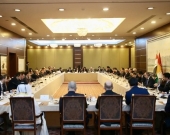Moscow police detain 15 Islamists with suicide belts

The interior ministry said members of Takfir wal-Hijra -- a group formed in Egypt in the late 1960s and outlawed in Russia in 2010 -- had been discovered hiding weapons and suicide belts along with extremist literature.
Footage aired on Russian national news channels showed helmeted riot police burst into a high-rise apartment in a pre-dawn raid and throw several men face down on the floor.
Police were shown opening plastic bags holding grenades and pistols as well as a heavy black object identified by one unnamed officer as an explosive belt.
The interior ministry said the group had been funding its activities by "conducting general crime" in and around Moscow.
Russia remains on heightened security alert ahead of the February 7-23 Winter Olympic Games in the Black Sea resort of Sochi that lies near the volatile North Caucasus.
A top North Caucasus guerrilla commander who has claimed responsibility for a string of deadly suicide bombings in Moscow has threatened to target the Sochi Games.
Officials in 2011 claimed to have uncovered a complex terror plot against the Games by Islamist rebels who allegedly used little-policed mountain regions of Georgia as their base.
Sports Minister Vitaly Mutko has said Russia is "very worried" about security at all its sporting events.
Takfir wal-Hijra was quashed in Egypt in the 1970s but is believed to have cells linked to Al-Qaeda in several European and other countries.
The TrackingTerrorism.org website said members of the puritanical group have included the 9/11 US terror attack pilot Mohamed Atta and former Al-Qaeda leader in Iraq, Abu Musab al-Zarqawi.
Russia's RIA Novosti state news agency said the group's activities were first detected in ex-Soviet nations such as Ukraine about five years ago.
But RIA Novosti said experts questioned whether Takfir wal-Hijra members in the region had actual links to the original organisation in Egypt or had simply assumed the name of a relatively well-known terror group.
"Still, since these groups essentially share the same ideology and are prepared to resort to violence to achieve their goals, this is clearly a threat," the news agency quoted Russian Institute for Strategic Studies analyst Yelena Suponina as saying.
Russia's three-year streak without attacks outside the North Caucasus was broken in October when a female suicide bomber killed six people on a bus packed with students and workers in the southern city of Volgograd.
Security officials later claimed to have killed the woman's husband -- believed to have been a member of an Islamist terror network -- in a special security operation in the North Caucasus region of Dagestan.
Russia's lower hose of parliament responded to the attack by adopting tough new legislation that makes families of terrorists financially accountable for the damage incurred in any attack.
AFP












